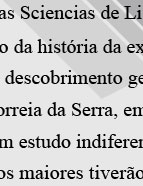

................................
Other documentary collections should not be overlooked. The Torre do Tombo also houses the São Vicente Collection, consisting of documents originating from the Mafra convent/palace, which formed the state's inactive archival records, and the Manuscritos da Livraria [Library Manuscripts], with items from the nationalisation of the assets of religious orders, the Jesuits, the Holy Office, the Real Mesa Censória [Royal Censorship Board ], and also of private origin, particularly those belonging to the 2nd Viscount of Santarém, which served for the creation of his work. The library of the Lisbon Academy of Sciences also inherited the libraries of the dissolved convents, notably the collection from the former Convento of Nossa Senhora de Jesus, also known as the "Documents of the Friars," catalogued as the Série Vermelha [Red Series]. The Ajuda Library holds a valuable repository of manuscripts consisting of 2,439 volumes of codices belonging to the former Fundo da Coroa [Crown Collection], which travelled with the royal family to Brazil and returned in 1821. The "Reserve" sections of the National Library of Lisbon, the Public Library of Évora, and the General Library of the University of Coimbra hold notable collections concerning Portugal's relations with other powers during the 17th and 18th centuries. Finally, regarding foreign archives, there are several catalogues of manuscripts relevant to Portuguese diplomatic history: those in the British Library were inventoried by Frederico Francisco de La Figanière (1853) and the Count of Tovar (1932); Morel-Fatio listed those of the Fonds Portugais of the National Library of France (1892), and Luís Ramalhosa Guerreiro (2000) provided a detailed summary of these documents. Similar work was also conducted by Charles Boxer concerning the State papers of Portugal (1979-1983), archived in the Public Record Office of London, which opened in 1838.
In many cases the publication of sources often accompanied the synthesis of historical narratives. After the Apontamentos para a história diplomática de Portugal desde 1826 até 1834 [Notes on the Diplomatic History of Portugal from 1826 to 1834] by Advisor Félix Pereira de Magalhães (1871), the four volumes of Apontamentos para a História Diplomática Contemporânea [Notes for Contemporary Diplomatic History] by António Vianna provided a remarkable reorganisation of essential documents for subsequent works on Luso-Brazilian diplomacy and politics, particularly those of Ângelo Pereira, Oliveira Lima, and António Ferrão. Published between 1901 and 1958, they cover the period from 1789 to 1815 (the Introdução [Introduction]) and from 1820 to 1828 (the remaining volumes).
